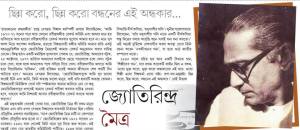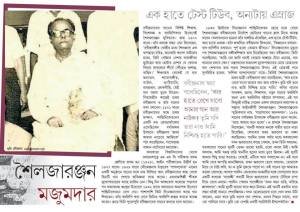Regardless of whether Bengalis read Rabindranath Tagore’s work with attention or not, lately curiosity in Rabindranath as a person has flared up. This eagerness has recently found a new focus. This is what might be described as Tagore’s ‘love life.’ One notices a lot of discussion, writing, serialized accounts and films that deal with this. There is no point rueing this eagerness. Rabindranath never labelled himself an ascetic of any sort. But one must look into the recent phenomenon affecting Bengalis, namely their overwhelming interest in Tagore’s ‘love life.’ It is worth considering what Tagore has been reduced to in this cyclical waxing and waning.
One might describe this current uproar over Tagore’s loves as an ‘opposing reaction.’ He was the founder of the school at Santiniketan and his robed and bearded appearance as Gurudev is the image most Bengalis think of. Many adore him, almost as an otherworldly presence. They feel that it is utter sacrilege to even think about his love life. They keep their Tagore safe by judging his love poems through abstract comparisons and in the guise of philosophical discussions of the infinite. Perhaps this hysteria regarding the purity of Tagore was once so great in Bengali society that we are now seeing an opposing reaction to it. Marketability plays a big role here. The personal life of the poet is now a top billed item in the market. During his life he was not bereft of female company. Many people from near and far were keen to be in the company of the talented, good humoured and handsome poet and there were women among this devoted following. Neither was he averse to life. The life of a man who once wished to experience life in all its diversity has today become a subject of stories of mere physical attraction at the hands of contemporary purveyors of Bengali culture; this is hardly surprising seeing that today’s Bengali culture has blossomed as a opposing reaction to the past. The names of Kadambari, Ocampo and Ranu are heard again and again. Especially that of Kadambari owing to her suicide. Bengalis do not have the mental fortitude to take part in a great tragedy but on the whole they have a great inclination and interest in light melodrama. That need has been fulfilled by the relationship between Tagore and Kadambari. This is a sign of two complementary traits seen in Bengalis. Firstly, Bengalis are not aware of appropriateness and hence secondly, they have no empathy. Empathy is the ability to feel the same feelings as someone else. One must have empathy to understand and know another person and this is helped by having some idea about the person we need to understand. One has to study deeply and learn much for that. In the West a lot of work has been done on the personal lives of famous thinkers but at present Bengal lacks even the smallest part of the effort, intelligence and imagination that is at work in those ventures. Tagore had wished to make imagination a partner to empathy. This imagination is characterised by the ability to be as another or the desire to do so. One must first understand the other. If one studies Tagore’s life and reads his work with attention to detail, one can see how he attempted all through his life to especially honour the equation between men and women. Tagore never denied that physical attraction is ever present in the relationships between men and women and within the human heart. He singled out his predecessor Vidyasagar for special praise because Vidyasagar recognised that a widow’s body did not turn to stone simply because her husband passed away. Tagore was thus different from the ‘path of selfless sacrifice’ adherents of the nineteenth and twentieth century who declared that this natural desire for physical love was to be suppressed for the sake of society and country. Bankim Chandra decreed in ‘Mrinalini’ and later in ‘Anandamath’ that personal feelings of love were to be locked away so that one might serve the country. But Tagore did not sacrifice Ela and Antu’s love for the sake of the country in his novel ‘Char Adhyay’.
He believed that a woman’s self esteem played a very important role in marital relations and that this self esteem was not found only in educated women living in cities but in all self aware women, no matter what their economic background. In his story ‘Shasti’ or Punishment, it is this self respect that gives the wrongfully blamed Chandara the strength to refuse a meeting with her accuser and husband Chidam before she is hanged. It was self respect again that gave the rural woman Mrinal the courage to leave her husband’s home (Streer Potro).
Tagore did not merely wish to define and construct a new language for femininity; he created a new definition for masculinity as well. His ideal male does not occupy a woman but rather attempts to understand women through his own pliant humanity. Nikhilesh of ‘Ghawrey Bairey’ and Madhusudan of ‘Jogajog’ are noteworthy in this respect.
It is only natural that he who placed such importance on the mutually sympathetic understanding in relationships between men and women would himself become a person trusted by women in his personal life at a time when not understanding the female mind was the rule. He had relationships with various people such as Ranu, Kadambari and Ocampo. Those relationships differed in both importance and significance. Kadambari’s death made Tagore grow as a writer and the memories surrounding her death have returned again and again in many of his writings. And yet he is seen as a loving and dutiful husband to Mrinalini. Various women who were spellbound by his qualities came into his life after Mrinalini’s death. These human interactions all enriched his life. Our minds seek varied experiences. It is as though he enjoyed that variety of experience through his varied relationships. He never insulted anyone’s self respect.
The average Bengali is happy enough with their success in reducing the great to their own stature. But the act of reducing everyone to one’s own measurements without attempting to understand them is in fact a form of terrorism. If we persist in the terrorist act of pulling everyone down to our level, the stature of the Bengali people will keep lessening till we are able one day to sit on the kerb and still find our feet swinging in the air.
(Translation, mine)








You must be logged in to post a comment.